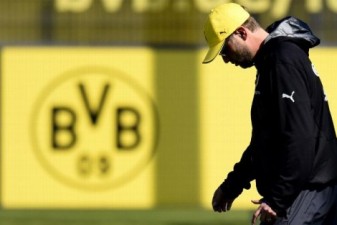
18/04/2015 12:24
Five reasons Jurgen Klopp is leaving Borussia Dortmund
Jurgen Klopp has announced his decision to leave Borussia Dortmund. What from an outside perspective looked like a relationship for life began to turn into a dead end when Mario Gotze left for Bayern Munich in 2013. Untested on that level, BVB were not able to come up with the right answers to the challenges that they suddenly faced. In uncharted territory, Klopp's demise began. It all ended on Wednesday in a highly emotional news conference on the first real day of spring in Dortmund.
Here are five of the key reasons Klopp is leaving Dortmund:
1. Gotze departure/Mkhitaryan transfer
In April 2013, Borussia Dortmund were in control of their fate. Or so it seemed. Exactly one year prior, Mario Gotze penned a new deal, valid until the summer of 2016. The contract included a release clause, and while BVB might have braced for a potential departure, they likely believed it would happen in 2014. They were wrong.
Having coped with the losses of Nuri Sahin and Shinji Kagawa the two previous seasons, BVB were unable to replace the Bavarian youngster, who came through the ranks of the club's youth academy before leaving for Bayern Munich in 2013. When announcing his departure on Wednesday, Klopp admitted that he made the decision in order to spare Dortmund any kind of pressure to have to make a quick decision on a new manager -- the same type of last-minute decision-making Klopp was forced to do when players made unexpected departures.
Borussia Dortmund were forced into the transfer market unprepared, and signed Armenia international Henrikh Mkhitaryan for a club-record transfer fee of some €27 million. Despite a decent first campaign, it soon became obvious that the Armenian was not a replacement for Gotze, who was able to make quick decisions and see spaces open for his teammates where there had not been any spaces. After two years it's evident that Mkhitaryan is a good footballer but does not have the vision possessed by Gotze.
2. Lewandowski departure/Bad scouting
Gotze's transfer also meant that Borussia Dortmund dragged the Robert Lewandowski saga into a new season. The club vowed to not sell him to Bayern Munich, and counted up the numbers, claiming that he'd be more valuable for Dortmund than a transfer fee in 2013. He was. The Poland international played on like nothing happened, became the league's top scorer, but was more than just that for BVB. He was the go-to-guy in Dortmund's attack, and made room for players like Marco Reus to shine.
Yet, despite having over a year to scout Lewandowski's successor, Dortmund came up with a two-player solution. They bought Ciro Immobile and Adrian Ramos. And both failed to have an impact for Dortmund, with BVB's footballing qualities diminishing with the Italian striker on the pitch. Both could be part of a major squad overhaul in the summer, depending on the new coach.
3. Failure to implement a Plan B
Football is a fast-moving business. What is new today will be dated tomorrow. What is spectacular today will be punished tomorrow. The young Borussia Dortmund early on in the Klopp era needed only a handful of seconds from winning the ball to scoring, or at least creating chances. They had the player, ruthless when winning the ball, but also able to play the clear pass. Sometimes long, sometimes short, always finding small pockets of space.
But the players grew older and teams began to test new tactics against Borussia Dortmund. At first, they attacked Mats Hummels, who was doing all the build-up play from the unusual centre-back position. That worked to parts. They also began handing possession to BVB, and learned that by sitting deep this also meant freeing themselves from Dortmund's Gegenpressing. The last time that Dortmund press worked was in the first match of this season's Champions League when a fantastic BVB side stormed past Arsenal. But even in the Bundesliga, clubs like Bayern only handed the ball to Dortmund. Klopp, citing a difficult preseason, had no answer, even after the winter break.
4. No fresh blood
Borussia Dortmund were the most thrilling side to watch in Germany, and for one season also in Europe. They were a team full of hungry youngsters, without a trophy, without a major success. Their famous Gegenpressing and their hard-working style was loved throughout the continent.
It was also draining. Holding midfielder Sven Bender has struggled with various injuries in recent years, and so has left-back Marcel Schmelzer and Nuri Sahin, one of two players -- Kagawa being the other -- brought back to the club in a bid to re-create the romantic idea of that group of players playing their hearts out for the club.
Klopp relied on them. Klopp did not want to cut ties. He was thankful, and maybe too thankful.
At the same time, BVB brought in players from outside of Bundesliga. Some of them failed to adapt to what makes Borussia Dortmund the "extraordinary club" it is. But with Dortmund being forced into the transfer market year, in year out, their transfer policy remained reactive, and the club and Klopp missed out on implementing new blood into key positions, like holding midfield or at full-back.
5. Becoming bigger than the club, and realizing it
With all of the above unfolding into what ESPN FC writer Raphael Honigstein has called a "black swan season," it became evident that Klopp had grown into something bigger than the club itself.
He used it to shield his players from the criticism, and took hit after hit from the German media, who themselves had difficulties finding the right words, knowing that Klopp was Borussia Dortmund, just like Arsene Wenger is Arsenal or Sir Alex Ferguson was Manchester United. But as much as he loved the club, he did not want that. On Wednesday, he said that "the club is bigger than all of us," and added that he felt that whatever he did next at Dortmund was always going to be viewed in the light of his successes of the past few years. In the end, for Klopp, his presence as manager was blocking the development of the club. "The evil of the good deed," he said, and announced his departure to allow the club to find itself again.








